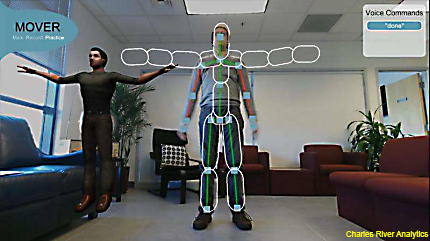ONR software helps those with traumatic brain injuries perform rehab
The MOVER software helps guide soldiers suffering from TBIs through rehabilitation exercises in their homes.

MOVER's 'skeleton' mirrors the patient’s movements.
Military researchers have continued to make strides in technological solutions to aid wounded warriors. For those with traumatic brain injuries, or TBIs, the Office of Naval Research has developed something called the Mobile, Virtual Enhancements for Rehabilitation, or MOVER, a software system that will walk outpatients through exercises in their homes.
As ONR points out, one of the biggest problems for those suffering from TBIs is that, although performing rehabilitation exercises at home can give patients more time with family and less time at treatment facilities, the nature of their injuries can cause them to skip their exercises, forget to do them, or do them incorrectly.
The MOVER software, which can be installed on a laptop or PC with a camera or even with gaming consoles such as Microsoft’s Xbox Kinect for larger television screen access, can keep patients on track. A virtual skeleton made up of lines and shapes appears on the screen and mirrors the patient’s movements through the exercises.
Patients receive coaching from the software’s virtual skeleton, with pop-up text boxes or color shading within an area of the skeleton to correct the patient’s form. If a patient is leaning too far to the right, ONR explained, a colored shape will appear on the left demonstrating how the exercise can be corrected. Featured exercises include lunges, knee raises and squats. In addition to correcting form, the MOVER software will track patient progress.
“Eventually, we want to improve the virtual coaching so it provides commands and encouragement to users vocally and they in turn can respond back,” said Dr. James Niehaus, a scientist with the lead company working with ONR, Charles River Analytics. Furthermore, Niehaus said he hopes that a mobile application will someday be created to alert patients about workout times.
“There are times when you don’t feel motivated to work out,” said Lt. Cmdr. Brent Olde, a program officer in the Human and Bio-Engineered Systems division of ONR’s Warfighter Performance Department. “You also risk hurting yourself by exercising incorrectly. That applies to everyone, healthy or not. Now imagine how much harder it is for someone with a brain injury. They may need help, which is where MOVER comes in.”
Patients will have to be approved to use the software by a physical therapist according criteria such as capability, mobility, tech savviness and video game experience.
With successful tests already completed, a six-month pilot study of the software will be launched later this year involving nearly 40 TBI patients and therapists. The tests will take place at Boston’s Spaulding Rehabilitation Hospital.
NEXT STORY: DISA sets Forecast to Industry for November